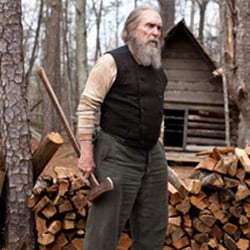Tribeca Interview: Get Low's Robert Duvall

In his newest film Get Low, Robert Duvall plays Felix Bush, a man who after a devastating and mysterious incident, disappears to live his life in the woods. Forty years later, he reemerges with a mission: he wants to begin planning his funeral, only he wants to have it while he’s still alive.
Duvall, having started his career playing the strange Boo Radley in 1962’s To Kill A Mockingbird is certainly one of the greatest American actors of all-time, and all of that talent is on display his newest work. Mixing both comedy and drama into his performance, Bush is a mixed character that only a man of immense talent could take on and Duvall does it masterfully. Attached to the project for about eight years before enough money was raised to fund its production, I had the privilege to not only listen to how he came to the role, but learn his approach to acting in general.
What do you think people would say about you at your funeral, or what would you want people to say?
My funeral? Whatever they want to say. I would say, “let them say what ever they want.” I don’t know. Pretty good guy, you know? I don’t know what I’d want them to say, whatever they wanted to say. There would be no censorship.
One of the things people regard you so brilliant for is being able to sink into your character. From your point of view, as the actor, is that something that you do when you play a character like Felix Bush? How easy is it to leave him at the end of the day?
It’s play acting. Kid’s play, acting. It’s like, “you play the doctor, I’ll play the king.” It’s play acting, it’s fun. You don’t really become something else. Well, you do, but you only have one set of emotions, one psyche, so you use that. Like turning it to make it work for you. And if it goes well, at the end of the day you say, “let’s go out.” If it doesn’t go well, you go, “oh my God, I’m worn out.” If it goes well there is an elation process, being elated you say “ok, I feel good.” I did a scene one time, for a first time producer, and it was a very emotional scene, but it went well. And when it was over, he, watching me, I came off set and asked, “you know the best way to cook soft-shell crabs? I’m from Maryland, and the best way to cook crabs is this way…” and he didn’t know you could come out of something that quick. If it’s real then you can come out of it. By doing something real and immersed in something, then you sort of have to be relaxed and off-hand and in touch with yourself. You know what I’m saying? It’s not like, “now I’m the character.” You watch some of these actors that come on stage with a big bag of yesterday. It’s a game. The more you’re in-touch with yourself the better, to be able to call on things without calling on them. Just let it happen.
It’s so fantastic to see you in a big role like this as opposed to some of the supporting roles that you’re doing in big budget films. Is it much more satisfying for you?
CINEMABLEND NEWSLETTER
Your Daily Blend of Entertainment News
Yeah, because rather than do a lead in a movie, I’d rather play supporting roles and cameos. And when something like this comes along it’s more important, and it’s a valid thing. Some of the best projects are those under $10 million. The low-budget films, to me, it’s the kind of film that could fit really well into the ‘70s, taking it back in time.
Maybe in your film career more than most I’ve noticed, maybe because of this ‘work’ you talk about, about knowing yourself, but there seems to be, in a number of roles, from Tender Mercies right through to Crazy Heart, there isn’t an essential persona that comes through. Is that something you’re aware of?
I guess I’m a character actor, yeah. But you have to everything in the character within yourself that fits that. Each part’s different. You play what you play and I try to be as versatile as I can within who I am. I mean, this guy’s very much different from my favorite role I ever played, which was Lonesome Dove, which was Texas ranger who’s out there, who’s kind of a libertine and out-going guy, not a closed guy, you know? So you try and find in yourself what the character calls for.

This project has been in development for a while and you’ve been attached for a long time. What originally drew you to the project and what made you stay with it?
Well, I only stayed with it in a very passing way because they couldn’t get the money. I said the Zanuck dynasty can’t raise $7 million, what are you going to do? I came into it, and was attracted to it, because it’s the kind of movie that’s pretty unique unto itself and I don’t think they’re going to be doing a remake of it 20 years from now, like they’re doing everything else for God’s sake. There are original projects and this is certainly one of them. And, I said this before, I probably wouldn’t be sitting here if it weren’t for the guy, Charlie Mitchell, who they brought in towards the end to do rewrites, a guy from Alabama who really put the touches on this that really made this work for me, because it had kind of gone astray in the writing process. But the initial thing of a guy setting up and going to his own funeral, that kind of really interested me – pretty unique.
Did you enjoy playing an intimidating character?
I think he’s only intimidating from the point of view of people who think he’s intimidating. I don’t think he tries to intimidate people, but they take that from him. Because he could have been a school teacher, he could have been a lawyer, he could have been many things. It’s not like he was a wacked, retarded guy. He became eccentric. You didn’t see a lot of times of him coming out, because I think a lot of hermit-like people, eccentric people, when they come out, the ones that I’ve met are kind of hermits, all they want to do when they come out is talk, talk, talk, talk, talk, and then they go back. They stay hermit-like. Interesting guy, I really enjoyed working on it, and I have to give credit to Dean Zanuck for sticking in there. I would see him and his father and say, “forget about it, move on to other things.” I didn’t think it was going to happen. And finally it did happen, and I’m glad it did. Very original, I like the originality of the whole story. A southern story, and the guy they brought in, Charlie Mitchell from Alabama, from the south, understood those touches of telling a southern story.
Why do low-budget films make the best films, in your opinion?
Well, there’s a good story, original story. Somebody says there’s a list of the ten best films that never get made in any given year, and sometimes smallest stories are pretty unique and nice, but still, for some reason, it’s hard to get them made. Because they don’t necessarily make that much money in return for the investors, I guess. I was talking about a film that I saw, as an example, that that 17-year-old girl from Iran made, The Apple. Beautiful movie, but they made it for a shoestring. It probably didn’t make money, but so what?
What has been the most important thing you’ve learned when it comes to acting and directing?
To me they’re very connected - for me. Directing is a continuation of acting, and the most important thing, I guess, is to try find that journey from ink to behavior. At first it’s only written work and then you have to find the behavior, however you do that. And you’re acting and directing to make that live.
What is the appeal of southern stories and western stories for you?
They’re part of our heritage. The English have Hamlet and King Lear, the English have Shakespeare, the French have Moliere, the western is ours. It’s our genre from Alberta on down. I don’t know if they really tell the story, because they say the most difficult thing for the cowboy guy is that they had to get a good night’s sleep on the hard ground. That was the hardest thing. And, you know, after the Civil War, three out of five cowboys were black cowboys. And the southern guys, the guys from the Confederate Army, those guys went out west and became cowboys. There wasn’t anything left from their land. It’s part of our heritage.

Eric Eisenberg is the Assistant Managing Editor at CinemaBlend. After graduating Boston University and earning a bachelor’s degree in journalism, he took a part-time job as a staff writer for CinemaBlend, and after six months was offered the opportunity to move to Los Angeles and take on a newly created West Coast Editor position. Over a decade later, he's continuing to advance his interests and expertise. In addition to conducting filmmaker interviews and contributing to the news and feature content of the site, Eric also oversees the Movie Reviews section, writes the the weekend box office report (published Sundays), and is the site's resident Stephen King expert. He has two King-related columns.
Most Popular







